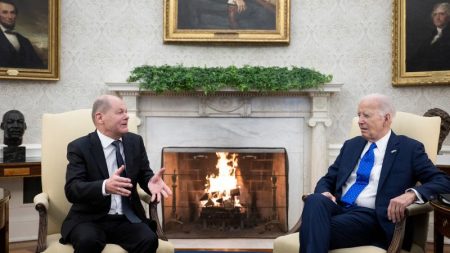Justice Samuel Alito did not disclose a luxury 2008 trip he took in which a hedge fund billionaire flew him on a private jet, even though the businessman would later repeatedly ask the Supreme Court to intervene on his behalf, ProPublica reported.
In a highly unusual move, Alito preemptively disputed the nature of the report before it published Tuesday night, authoring an op-ed in The Wall Street Journal in which he acknowledged knowing billionaire Paul Singer but downplaying their relationship.
The new report adds to the growing list of ethics questions surrounding the court, which have become a key focus of congressional Democrats. Earlier this year, reporting by ProPublica about a relationship between Justice Clarence Thomas and a frequent Republican donor led to calls for greater transparency about the financial disclosure process for the Supreme Court.
The publication said Singer flew Alito to Alaska on a private jet and that the justice did not report the fishing trip or the private jet flight on his annual financial disclosure or recuse himself from cases involving Singer’s hedge fund that came before the court. In the years following the 2008 trip, the billionaire’s hedge fund “came before the court at least 10 times in cases where his role was often covered by the legal press and mainstream media,” ProPublica reported.
“In 2014, the court agreed to resolve a key issue in a decade-long battle between Singer’s hedge fund and the nation of Argentina. Alito did not recuse himself from the case and voted with the 7-1 majority in Singer’s favor. The hedge fund was ultimately paid $2.4 billion,” according to ProPublica.
CNN has reached out to Singer’s company for comment, as well as the Supreme Court.
Hours before ProPublica’s report went online, Alito took the rare step of preemptively responding to allegations of ethics impropriety leveled against him before the charges were actually published. ProPublica said it had sent Alito a “list of detailed questions last week, and on Tuesday, the Supreme Court’s head spokeswoman told ProPublica that Alito would not be commenting.”
In his op-ed, Alito said that he has spoken to Singer “on no more than a handful of occasions” with the exception of “small talk” during a fishing trip 15 years ago and said the ProPublica charges against him are not “valid.”
ProPublica, however, documents several interactions between the justice and the billionaire. It included a photo of the two grinning as they held salmon they caught on the trip. Singer also introduced Alito at a Federalist Society event the next year where Alito joked about the fishing trip they took together, according to ProPublica, which also published a photo of the two together at the event. The following year, Singer once again introduced Alito at an event held by the Manhattan Institute, a conservative think tank, to which Singer has donated millions.
“On no occasion have we discussed the activities of his businesses, and we have never talked about any case or issue before the Court,” Alito wrote in his op-ed.
Alito said that his staff routinely checks the names of the parties in each case that comes before the court and “any other entities listed in the corporate disclosure statement required by our rules.” He said that Singer was not “listed as a party” in any of the cases provided to Alito by ProPublica, nor did his name appear in any of the corporate disclosure statements or the cert petitions or briefs in opposition to certiorari. He notes that only one case was ultimately granted – Republic of Argentina v. NML Capital (12-842) – and that Singer’s name did not appear in the filings. At the time, however, the involvement of Singer’s hedge fund in the dispute with Argentina was widely reported in American media, ProPublica noted.
As for the flight, Alito said Singer “allowed me to occupy what would have otherwise been an unoccupied seat on a private flight to Alaska.”
The justice said it was his understanding that the flight would not “impose any extra cost on Mr. Singer” and that had he flown commercial, it “would have imposed a substantial cost and inconvenience on the deputy US Marshals who would have been required for security reasons to assist me.”
He also said he stayed at accommodations provided by the owner of the King Salmon Lodge, described by ProPublica as a “luxury fishing resort,” for three nights in a “modest” one-room unit, and ate meals that were “homestyle fare.” The lodge – where guests reportedly said they drank wine that cost $1,000 a bottle, though Alito in his op-ed said he did not consume wine that cost anywhere near that amount – was not owned by Singer.
Alito said that under the rules in effect at the time, the hospitality did not have to be reported.
The new report is likely to draw additional scrutiny from Democrats, who have already been calling for greater financial transparency from Supreme Court justices.
Earlier this year, reporting by ProPublica about the relationship between Thomas and GOP megadonor Harlan Crow detailed luxury travel and other lavish gifts that Thomas received from Crow, as well as Crow’s purchase from Thomas and his family the home still lived in by the justice’s mother. The real estate transaction and the bulk of the hospitality went unreported on Thomas’ annual financial disclosures, as did Crow’s reported payments for the tuition of a grandnephew of Thomas’.
Thomas has defended the omission of the Crow-financed travel from his reports, with a statement that said the justice was advised at the time that he was not required to report the hospitality. A source close to Thomas previously told CNN he plans to amend his disclosures to reflect the real estate transaction.
Read the full article here













